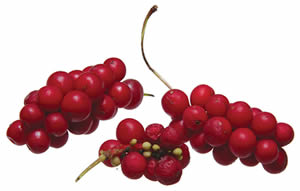- Schisandra is a plant from found primarily in Asia. The fruit is used as food and also to make medicine.
Contents
Uses
Schisandra is used as an “adaptogen” for increasing resistance to disease and stress.
- Increasing energy
- Increasing physical performance and endurance
- Preventing early aging and increasing lifespan
- Normalizing blood sugar and blood pressure
- Stimulating the immune system
- Speeding recovery after surgery
- It is also used for treating liver disease (hepatitis) and protecting the liver from poisons.
- The Chinese have developed a liver-protecting drug called DBD that is made from schisandrin, one of the chemicals in schisandra.
- Treatment of high cholesterol
- Coughs
- Asthma
- Sleep problems (insomnia)
- Nerve pain
- Premenstrual syndrome (PMS)
- Chronic diarrhea
- Dysentery
- Night sweats
- Spontaneous sweating
- Involuntary discharge of semen
- Thirst
- Erectile dysfunction (ED)
- Physical exhaustion
- Excessive urination
- Depression
- Irritability
- Memory loss
- Improving vision
- Protecting against radiation
- Preventing motion sickness
- Preventing infection
- Boosting energy at the cellular level
- Counteracting the effects of sugar
- Improving the health of the adrenal glands
Benefits
- The chemicals in schisandra improve liver function by stimulating enzymes (proteins that speed up biochemical reactions) in the liver and promoting liver cell growth.
Cautions
- Pregnancy and breast-feeding: Schisandra is POSSIBLY UNSAFE when taken by mouth during pregnancy. There is some evidence that it might cause the uterus to contract, and this might lead to miscarriage. Do not use schisandra during pregnancy. There is not enough reliable information about the safety of taking schisandra during breast-feeding. Stay on the safe side and avoid use. Not enough is known about the safety of schisandra during breast-feeding. Stay on the safe side and avoid use.
- Epilepsy: At least one expert warns against using schisandra if you have epilepsy. The reason for this warning is not clear, but it may be due to a concern that schisandra could possibly stimulate the central nervous system.
- Gastroesophageal reflex disease (GERD) or peptic ulcers: Schisandra might make these conditions worse by increasing stomach acid.
- High brain (intracranial) pressure: There is a concern that schisandra might make this condition worse because it could possibly stimulate the central nervous system.
Interactions
Moderate Interaction Be cautious with this combination:
- Medications changed by the liver (Cytochrome P450 2C9 (CYP2C9) substrates) interacts with SCHISANDRA: Some medications are changed and broken down by the liver. Schisandra might increase how quickly the liver breaks down some medications. Taking schisandra along with medications that are broken down by the liver might decrease the effects of these medications. Before taking schisandra, talk to your healthcare provider if you are taking any medications that are changed by the liver.
- Some medications changed by the liver include celecoxib (Celebrex), diclofenac (Voltaren), fluvastatin (Lescol), glipizide (Glucotrol), ibuprofen (Advil, Motrin), irbesartan (Avapro), losartan (Cozaar), phenytoin (Dilantin), piroxicam (Feldene), tamoxifen (Nolvadex), tolbutamide (Tolinase), torsemide (Demadex), and warfarin (Coumadin).
- Medications changed by the liver (Cytochrome P450 3A4 (CYP3A4) substrates) interacts with SCHISANDRA: Some medications are changed and broken down by the liver. Schisandra might change how the liver breaks down some medications. Taking schisandra along with some medications that are broken down by the liver might increase or decrease the effects of these medications. Before taking schisandra, talk to your healthcare provider if you are taking any medications that are changed by the liver.
- Some medications changed by the liver include lovastatin (Mevacor), clarithromycin (Biaxin), cyclosporine (Neoral, Sandimmune), diltiazem (Cardizem), estrogens, indinavir (Crixivan), triazolam (Halcion), and many others.
- Tacrolimus (Prograf) interacts with SCHISANDRA: Schisandra might increase how much tacrolimus (Prograf) is absorbed from the gut. Taking schisandra along with tacrolimus (Prograf) might increase the effects and side effects of tacrolimus (Prograf). The dose of your tacrolimus (Prograf) might need to be changed if it is taken with schisandra.
- Warfarin (Coumadin) interacts with SCHISANDRA: Warfarin (Coumadin) is used to slow blood clotting. The body breaks down warfarin (Coumadin) to get rid of it. Schisandra might increase the breakdown and decrease the effectiveness of warfarin (Coumadin). Decreasing the effectiveness of warfarin (Coumadin) might increase the risk of clotting. Be sure to have your blood checked regularly. The dose of your warfarin (Coumadin) might need to be changed.
Other Names
Bac Ngu Vi Tu, Baie de Schisandra, Beiwuweizi, Bei Wu Wei Zi, Chinese Mongolavine, Chinese Schizandra, Chinesischer Limonenbaum, Chosen-Gomischi, Five-Flavor-Fruit, Five-Flavor-Seed, Fructus Schisandrae, Fructus Schisandrae Chinensis, Fruit aux Cinq Saveurs, Gomishi, Hoku-Gomishi, Kadsura chinensis, Kita-Gomishi, Limonnik Kitajskij, Mei Gee, Magnolia Vine, Matsbouza, Nanwuweizi, Ngu Mei Gee, Northern Schisandra, Omicha, Schisandra Berry, Schisandra chinensis, Schisandra chinensis var. rubriflora, Schisandra Sinensis, Schisandra sphaerandra, Schisandra sphenanthera, Schisandrae, Schizandra, Schizandra Chinensis, Schizandre Fructus, Schzandra, Southern Schisandra, Wuhzi, Wuweizi, Wu-Wei-Zi, Western Schisandra, Xiwuweizi.
References
Source: WebMD, “Shisandra”, www.webmd.com/vitamins-supplements/

